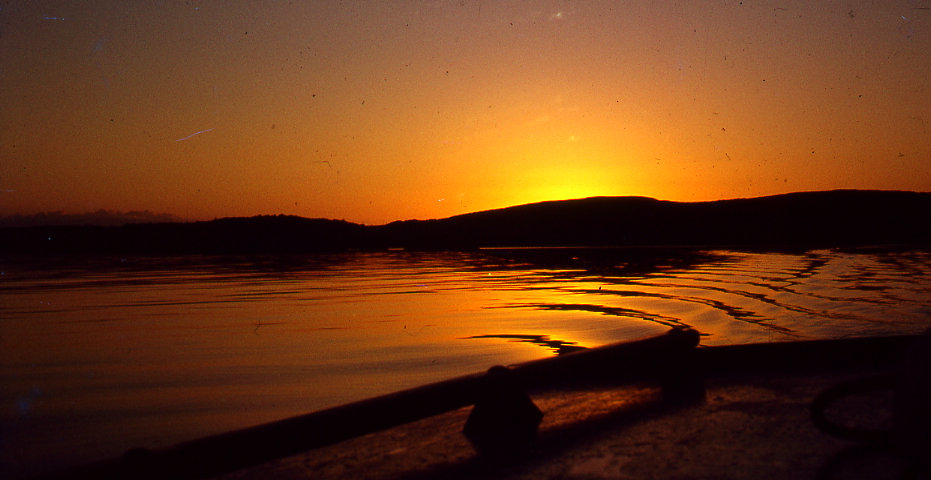Gigha always shone like a beacon in my imagination. For as long as I can remember, my Granny ( who had a strong tendency to see the world through rose coloured glasses) spoke of the wondrous home of our forebears, a tiny island off the coast of the Scottish Kintyre peninsular, perfectly beautiful. Bathed in the warm waters of the gulf stream, this was a Garden of Eden with mild winters, abundant wildlife and tropical plants. A special place where everyone was family. Not since her grandmother left the island in 1863, had any of her immediate family actually lived there, yet like a moth to a flame, she made the trip to Gigha often, for reasons I never fully understood.
I’m still trying to make light of this connection. I visited Gigha with my daughter in 2008 and my mother has also been. We go not as tourists, but rather as pilgrims, enjoying its wild and unsurpassed beauty, meeting with old friends, making new friends, of course, but mainly to connect with something quite intangible that we find only here, in Gigha. Perhaps it’s the land of our “dreamtime” where all dreams are spun of the same web. In Australian Aboriginal Culture, it is through the dreamtime that we are all related, with one reason for being. Quite possibly, this feeling could be stronger for those who have left a deep culture in the land of their birth, than for those who stayed.
Since the dawn of time, our human family has always moved around, in search of fertile land, a more congenial climate or a place of opportunity and an easier life for our children. When my ggg grandfather Donald McDonald left Gigha with his wife and children, he was embarking on a great adventure to do just that, to make what he thought would be a better life in the new world. They got no further than Tarbert, Argyll. My great grandmother continued the drift away, marrying a lad from Glasgow, where they raised thirteen children in the heart of the burgeoning industrial city. My family completed the journey, starting a new life in Australia, leaving behind our Scottish family, heritage and homeland. And a great life it has been. But something keeps calling us back, back to Scotland, back to Gigha.
I’ve wondered if it is the yearning for the simpler rythm and sense of community we identify with island life that draws us back. Maybe it’s the “Return to Eden” myth, the vision of warmth and fertility, with Gigha an island oasis in an otherwise hostile Atlantic, a metaphorical cocoon where we can find comfort from the harsh isolation of the technological age. Perhaps it’s a need to escape the perils of modern living, a life to which we as humans have not really adapted: too fast, too rapidly changing, too complex, too many people, increasingly devoid of a sense of spirituality and meaning. Could it be a longing to return to a life where people matter more than things? A life where we derive a sense of identity, purpose and satisfaction from a balance of independence, self sufficiency, cooperation, care and interdependence with our family and our community? In the 21st century, the answer is probably yes. But that doesn’t really explain why my grandmother kept pounding the beaten track from Glasgow to Gigha 50 years ago.
There’s something we lose in moving away from our traditional homeland. I think it’s a deep connection with the wisdom of the ages, be it spiritual, emotional or traditional wisdom. With every move we make, there’s a sort of reinvention of the wheel so to speak, a repositioning of belonging. I suspect that new feeling of belonging takes several generations to establish in a new homeland, and until that happens, we remain bonded in our heart or spirit to our original home.
To the present: I love reading the poems of Vie Tulloch, a highly respected elder of Gigha who has published several books. I bought my little collection from the shop in Gigha. The opening poem of “The Isle of Gigha: A Guide in Verse” reads:
“Gigha”
What’s in a controversial name?
The Isle’s the place.
Loving its enchantment,
Back visitors come yearly
Chatting up the locals
Longing to be part
Finding a distant cousin
Claiming a filial right.
I have a great deal of gratitude for the people of Gigha, who with good grace and warm hearts have kept welcoming us back over the centuries. Some of us will come to holiday and enjoy the peace, tranquility and magic of Gigha for a short while, some will come with due respect and reverence and some may come expecting the Gigha of their ancestors. Some may come with unwanted ideas, others claiming that filial right and some, I imagine, just being a damned nuicance! Either way we are always welcomed with true Scottish hospitality and leave vowing to return soon.
Gigha is many stories for me. The Galbraiths: the harper poets of Gigha, the last custodians of the Great Well, farmers of Drumeonmore, my ancestral mothers. The McDonalds: the McDonald brothers who gave the legendary Flora McDonald safe passage to Cara perhaps the same brothers who came from Islay and settled in Ardelay, John McDonald the weaver, who married Isobel Glabraith at Leim and Granny McDonald (Margaret Galbraith) who smoked a corn pipe. The McNeills, our Gigha cousins, Agnes and Betty and endless cups of tea, Katy McNeill who fascinated my Granny as she removed her dentures to eat! The ferry.
I made my own stories when I visited because of course, we’ve all moved on, and Gigha is every bit a part of the 21st century, albeit in a far more sane way than many other parts of the world. Here in my little corner of cyberspace, I hope to share some tales, old and new, about my connection with Gigha. It’s a place where it’s hard to take the rose coloured glasses off.
